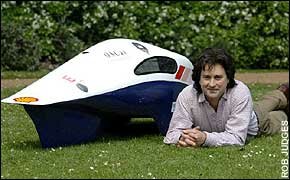
Articles
The Open Source Car - Unconventional Wisdom for Sustainability
Author: Sir John Whitmore
Source: Daily Telegraph
Publication Date: 5th June 2006
In this article Sir John Whitmore, columnist with the daily Telegraph motoring section, looks at a new approach to development. We all face an environmental crisis. Hybrid cars and biofuels might be interim steps in the right direction, but they are not sustainable solutions. Conventional wisdom predicts great technical problems and cost in overcoming these problems. But what about unconventional wisdom?
Most people believe that the future will be powered by hydrogen, but that affordable fuel-cell vehicles are decades away. Hugo Spowers's engineering degree and MBA were sufficient to convince him that the barriers were neither technical nor financial but human. He formed a consortium with BOC, Morgan Cars, QinetiQ and Cranfield and Oxford universities, with funding from the DTI, to design a fuel-cell car with a difference. Spowers' company is called OSCar and the project is called LIFECar - LIghtweight Fuel Efficient Car.

The Ech2o (with driver Jack Dex, left and with Hugo Spowers, above) was designed by OSCar with Oxford University and BOC. It draws its power from a hydrogen fuel cell.
Last week, he and I began a discussion by considering transport on land, air and sea. Aviation is the most problematic: carbon dioxide and nitrogen oxides are more damaging at altitude, the fuel is tax-free and consumption is very high. Yet road transport still accounts for 25 per cent of our fossil fuel use.
Where do we start? By thinking differently. A sustainable system lives off revenue - limited by the rate of supply, but of infinite duration. Our capital system (the extraction of oil) is not limited by rate of supply - but it is finite. Reducing the capital that we consume does not get us to a sustainable world. Beating your spouse less hard is no answer!
There is a conflict of interest between individual and collective transport. The motor industry strives to attract us onto the roads, and alternatives are limited. Road building is seen as investment, while improving rail is called subsidy. Why? Sustainability should be our guiding principle, not merely an option when cheap and easy.
We must improve and speed up trains to reduce overland air travel. With inter-city speeds of 350mph demonstrated in Japan, this is realistic. A means of trans-oceanic travel also exists; variously known as a Wig, Wise or (in its native Russian) Ekranoplan, this boat/aircraft hybrid uses ground-effect to fly a few feet above the surface and can transport huge loads at speed while using far less fuel than an aeroplane and causing negligible upper air damage; there is more, with fascinating video footage, at www.se-technology.com/wig.
And so to individual or family vehicles. Let's call them Movement Modules. If we take our egos off the road, MMs can be cheap, long-lasting (20 years), low-maintenance and leased rather than owned. Car makers profit from the opposite of what society needs, and therefore need regulation; if they lease MMs, they are rewarded for what we need and the system self-regulates.
The best power source is the fuel cell, with an electric motor at each wheel. With a petrol or diesel engine, weight, acceleration and top speed are all coupled, so the power required for acceleration delivers a top speed higher than necessary. By using OSCar's "Network Hybrid" architecture, the power demanded for cruising and acceleration are decoupled. The fuel cell is sized to maintain the required top speed, while braking regenerates energy that is stored in capacitors to provide 75 per cent of the power required for acceleration. Thus the fuel cell can be smaller, the vehicle lighter.
Cost is seen as a barrier to fuel cells, but the metric of cost per kilowatt is flawed: petrol engines are about £30 per kilowatt and fuel cells are £2,000 per kilowatt, but we buy cars by the car, not the kilowatt. Designing a lightweight car around a fuel cell, as opposed to grafting a fuel cell into a petrol car, reduces power requirements by about four-fifths. And if cars were leased rather than sold, they could supply revenue to the manufacturer for five times longer, making the fuel cell appear five times cheaper. So the metric misleads by a factor of 25!
Hydrogen sourcing, distribution and storage seem problematic, but we must think differently. Hydrogen is not a fuel but an energy carrier, obtainable from many different sources, whichever is best for the time and the place.
The storage problem evaporates if less fuel is used. OSCar's focus is on reducing consumption by whole system design. This is quicker and cheaper, and we need to do it anyway. By definition a sustainable system has to live off revenue, demand must be adjusted to meet supply and so consumption becomes far more significant than it has been in our refuelling infrastructure. This new architecture yields a fourfold improvement in consumption.
Of course a prodigious rate of innovation is required. Hitherto we have encouraged this through intellectual property rights, which harness the efforts of innovators, for the good of all, by granting a monopoly. But is this the best way? The example of Linux software would suggest not. The "Open Source" philosophy can incentivise a community to innovate for the good of all without restricting access to the output. The rate of progress is higher, the technology can spread more rapidly and the benefits are more equitably distributed.
This betrays the origin of the name OSCar - Open Source Car. Expect to hear a lot more about it.
Sir John Whitmore welcomes responses;
e-mail
or
write c/o
The Motoring Desk,
The Daily Telegraph,
1 Canada Square,
Canary Wharf,
London
E14 5DT.
Added to the database on 5th June 2006
Useful links
Keywords: Sir John Whitmore, columnist, daily Telegraph, motoring section, environmental crisis, Hybrid cars, biofuels, sustainable solutions,
